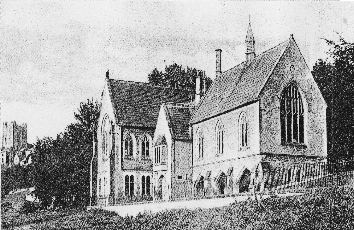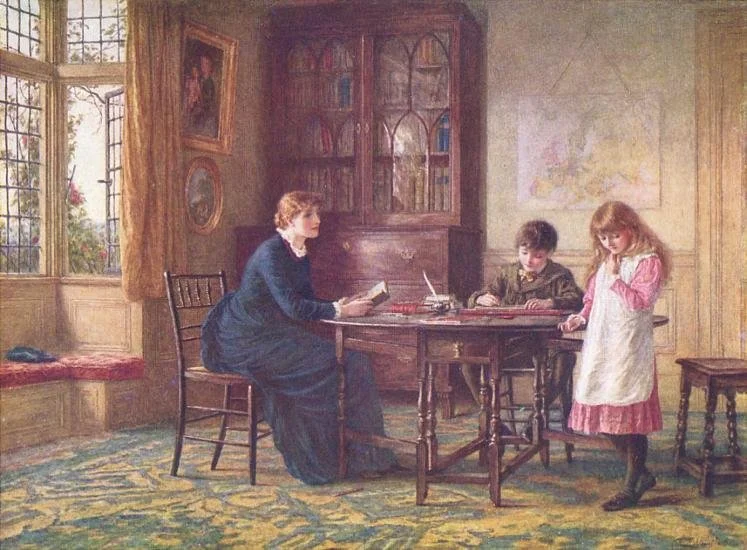Philosophy Presenting the Seven Liberal Arts to Boethius by Coëtivy Master / The J. Paul Getty Museum, Los Angeles, Ms. 42, leaf 2v
True Education
The correct formation of our feelings of pleasure and pain, which makes us hate what we ought to hate from first to last, and love what we ought to love; call this ‘education’, and I, at any rate, think you would be giving it its proper name. - Plato, Laws


Richmond Grammar School 1850
Introducing true education is no easy task. This is partly because it isn’t a “method” of education, and it isn’t a curriculum like the Common Core. It is an approach, a philosophy, a way of thinking. One could even say it is a way of living, though that might seem strange. To some degree, you are probably already familiar with true education, even if you went to the most liberal public school in the heart of a big city. In the last thirty years or so it has become very popular, especially in Christian circles. I would wager that even if you did not grow up in a “classical school”, you probably think and feel like a classically educated person more than you know. This is because the fundamental ethics and logic of that education are deeply rooted in our society. And though our society has tried to rip up those roots in recent centuries, they still endure. We are going to attempt to unpack some of the different aspects of true education here. We hope to examine parts that are more familiar to us and probably to you, as well as to explore foreign and uncharted waters. So jump in and explore with us as we endeavor to pursue the true, good, and beautiful.
Recent
Dr. Phillips graduated from Hillsdale College with a double major in Latin and Greek, and then went on to earn a PhD from the University of California Santa Barbara in Classical Studies. Currently, she teaches Latin and Greek for the House of Humane Letters. In this episode, she joins Katie to discuss the place of language in education, what Dorothy Sayers meant when she presented her famous essay “The Lost Tools of Learning” at Oxford, and the way her ideas have been misunderstood and misused in our time by neoclassical schools and institutions. Dr. Phillips explains in detail why education must always connect the universal principles to particular individuals and can never become a cookie cutter system designed to produce the same output with each child. Please listen, enjoy, and let us know your thoughts!
Angela Weiss, experienced Charlotte Mason homeschooling mom, pastor's wife, life long learner, and burgeoning scholar, joins us on this episode of our special series on education to talk about how wisdom, virtue, and knowledge intersect and work upon us. She and Katie specifically discuss Charlotte Mason's essay on The Great Recognition, as depicted by the 14th century fresco titled The Triumph of Saint Thomas Aquinas and the Allegory of Christian Learning. It covers the left wall of the Spanish Chapel connected to the Santa Maria Novella in Florence, Italy and was referred to as the Vaulted Book by John Ruskin. Angela and Katie discuss at great length the immense comfort that comes from remembering that the Lord is the source of all wisdom, so that our children's education depends not upon how much we ourselves know, but on the Holy Spirit guiding and working upon our children as they touch great minds through living books. We hope you'll join us for a fun and wonderfully comforting conversation about the source and nature of true education!
On this episode of our special series on education, Emily and Katie explore more deeply true education and what Charlotte Mason did for us by working so diligently to preserve the Western tradition of thinking and learning. They discuss the difference between the "why" and the "how" of educating, the importance of synthesis over analysis, and how the child must receive and digest knowledge herself instead of being force fed pieces of information. They dive into a lot more in this episode so don't miss it!
On this episode, Katie and Emily dive into a new series on education. Katie tells the story of her journey through the various worlds of education (Hillsdale, Liberal Arts, Classical Education, etc) and finally begins a brief description of the answers she has just started to find in Charlotte Mason, David Hicks, Karen Glass, Angelina Stanford, Cindy Rollins, and others. This is just the introduction...
While there are no “quick” fixes for our modern educational woes, there is a relatively easy-to-implement pedagogical method that can be used in any number of circumstances. This method is the art of narration. If you have dabbled in the world of Charlotte Mason at all (or perhaps you’ve dived in head first), narration is not a new idea. In fact, it is one of the primary tenets of the Englishwoman’s philosophy of education. Reading about it from her own works or learning about it from Karen Glass in her excellent book Know and Tell will quickly convince you that narration is some kind of magical antidote for our modern educational woes.
An updated introduction to the large world of “classical education”…
So, ultimately, what in the world does love have to do with education? A lot, actually. It has so much to do with education, in fact, that I think it’s the key link, the place we should be examining most closely. Simply put, we postmodern Americans have believed a great lie. We have believed that education would make our pocketbooks thicker but should do nothing to enrich our hearts.
J.D. Harding made a strong argument for general artistic education. A mind can only be fully developed once it has studied some form of art, even simple sketching. He goes on to argue that one cannot be fully alive to the influence of nature’s beauty without the medium of art, and claims that those who have not studied art see the beauty of creation only “through a glass darkly.”
The art, the pleasure, of building your own library attaches specific books to your soul. You make them your own, not only by reading what is written in them, but by touching them often, being perennially reminded of their lessons, marking them with your own thoughts, and committing them to your entire being.
Making that confession is tied inexorably to the next step - learning something new. And that is nothing but pure joy.








Katie is joined in this episode by three lovely ladies who all homeschool their children following the educational philosophy depicted by Charlotte Mason and embodied by the Ambleside Online curriculum. They share a wealth of wisdom, experience, reassurance, and an introduction to what this life of learning looks like. This conversation encompasses even more than homeschooling ideas, though. They dive into what education really is and they touch on many of the foundational ideas and principles of a true life of learning. Enjoy!